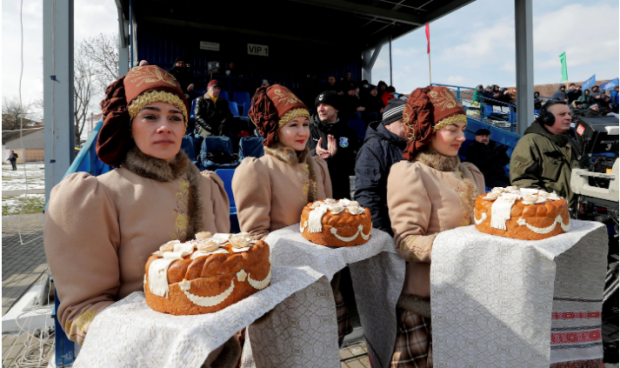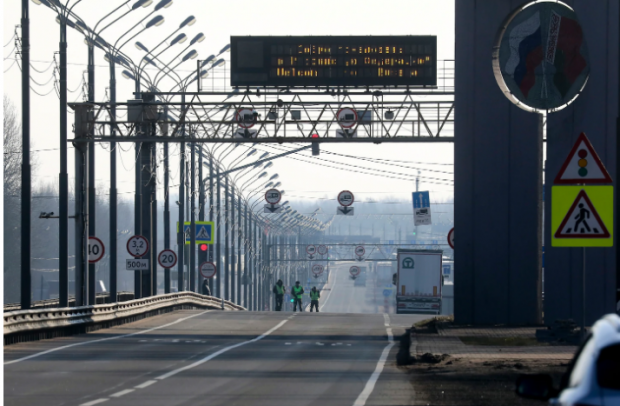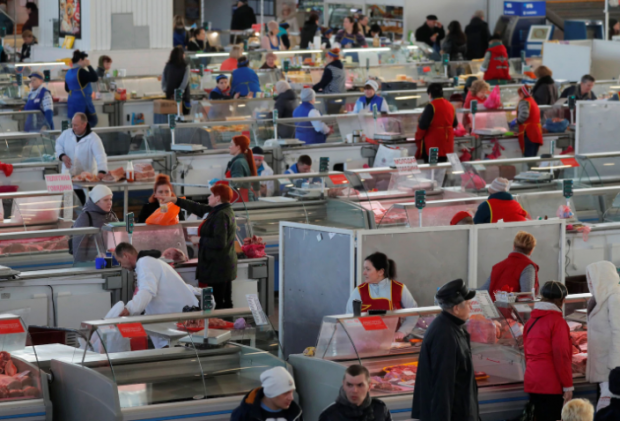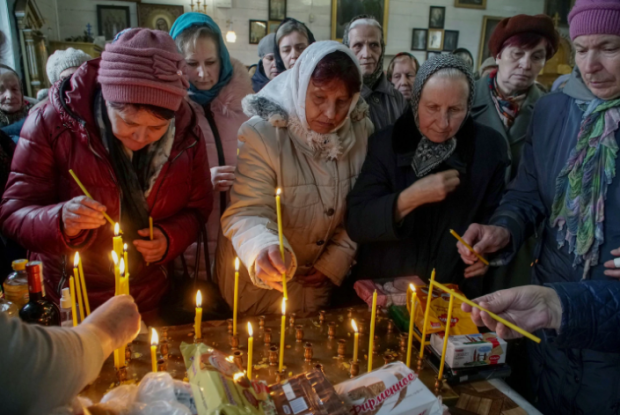No lockdown here: Belarus's strongman rejects coronavirus risks. He suggests saunas and vodka
Robyn Dixon, Washington post
1 April 2020, 22:21
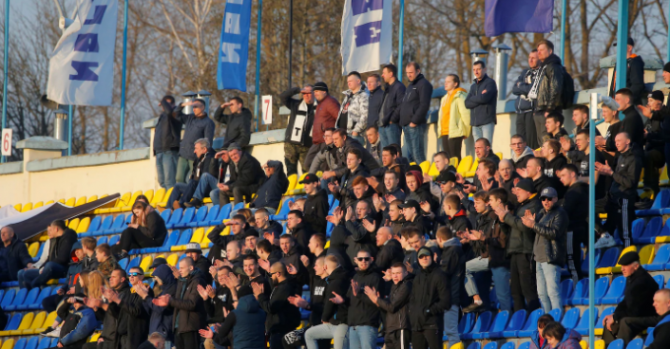 MOSCOW — In Belarus, authoritarian leader President Alexander Lukashenko has famously scoffed at the coronavirus as a “frenzy and psychosis.” His views also come with advice for citizens who don’t share his coronavirus scorn: Hit the sauna, down some vodka and get back to work.
MOSCOW — In Belarus, authoritarian leader President Alexander Lukashenko has famously scoffed at the coronavirus as a “frenzy and psychosis.” His views also come with advice for citizens who don’t share his coronavirus scorn: Hit the sauna, down some vodka and get back to work.
As surrounding countries have closed borders, shut down passenger transportation, banned mass events and effectively moved indoors, Belarus remains open, and Lukashenko stays defiant.
The country of 9.5 million — between Ukraine, Poland, Russia, Lithuania and Latvia — has reported 94 cases of coronavirus.
Still, Belarus’s soccer league plays on, the only one in Europe still on the field. Theaters are promoting premieres. Markets, shops, bars, restaurants and churches remain open, in the absence of any government order to the contrary.
The air force is conducting field exercises. A Christian Orthodox fair and exhibition, Easter Joy, will be held April 1-12 in the capital, Minsk, with events for families and children.
“This psychosis has crippled national economies almost everywhere in the world,” Lukashenko said Friday, visiting Belgips Plant, a plasterboard manufacturer.
It is a theme he has pounded relentlessly in recent weeks, convinced that the unprecedented measures against the pandemic are designed to benefit some and harm others. On March 19, he slammed the border closures by Belarus’s five neighbors as useless and “absolute and utter stupidity.”
Several other populist leaders have pooh-poohed the novel coronavirus, including President Trump, who initially said the outbreak in the United States was “very much under control.” Brazil’s President Jair Bolsonaro called it a media fantasy and “a little flu,” claiming that Brazilians could jump into sewers and not get sick.
But strongman Lukashenko seems to be in a league of his own with his disregard for the global strategies to contain the pandemic.
On Friday, he cited Trump’s warnings that the cure should not be worse than the disease as justification for his own course of keeping factories and businesses open and refusing to close the borders.
“Life is going on. You cannot put it on hold,” he said, announcing that Belarus would not cancel May 9 Victory Day celebrations, a day when elderly war veterans from the Great Patriotic War (World War II) get together to celebrate.
“His main idea is that panic is more dangerous than the virus itself,” said political analyst Artyom Shraibman, Minsk-based political analyst of the Carnegie Moscow Center. “So he’s definitely on this Trumpian side of this argument, and even more Trumpian than Trump himself because he does not implement any restrictive measures.”
Lukashenko has ordered the state security services to investigate anyone who falsely reports any coronavirus death. But the president, a former Soviet collective farm director, has also been poking fun at the idea of precautions and lockdowns in the country famous in the former Eastern Bloc for its Minsk Tractor Works founded in 1946.
On March 16, he said that instead of worrying about the virus, it was time to work in the fields, sowing crops.
“People are working in tractors. No one is talking about the virus,” Lukashenko said. “There, the tractor will heal everyone. The fields heal everyone,” he added, sparking a social media meme around small red pills shaped like tractors.
Lukashenko had jokes about vodka, too, which was often touted in Soviet times as a “cure” for just about everything. He recommended people not only drink it but wash their hands in it. (In fact, it is not strong enough to kill covid-19. The Centers for Disease Control and Prevention recommends disinfectants that are at least 70 percent alcohol; most vodkas contain 40 percent alcohol.)
“I don’t drink, but recently I’ve been saying that people should not only wash their hands with vodka, but also poison the virus with it. You should drink the equivalent of 40-50 milliliters of rectified spirit daily,” he said on March 16. “But not at work.”
He also recommended that people “wash your hands more often, have breakfast on time, have lunch and dinner.”
And even as mythical cures fly around social media, he suggested that taking a sauna frequently could help combat the virus, which he said did not survive at high temperatures.
“Go to the sauna. Two or three times a week will do you good. When you come out of the sauna, not only wash your hands, but also inside [with] 100 grams [of vodka].” He has predicted the virus will have passed by Easter, which Orthodox churches celebrate on April 19 this year.
It was only Thursday that Belarus imposed a requirement that arriving foreigners go into 14 days of self-isolation. Belarus has been carrying out targeted coronavirus tests — 24,000 so far (compared with almost 250,000 for Russia’s 145 million people) and contact tracing. Lukashenko also has ordered increased production of ventilators.
But he maintains that lockdowns and closures do not work.
That approach has not only provoked attacks from his political opponents. It also has worried Lukashenko’s powerful ally, Russia, which closed its border with Belarus, even though both countries signed a treaty on a unified state in 1999. Lukashenko said Russia’s move was “like starting a war.”
Shraibman, of the Carnegie Institute, said Lukashenko was more worried about an impending economic crisis as a result of the coronavirus than the virus itself.
“Civil society and opposition groups are very critical of the handling of this crisis,” he said. “People look around them and see that all the other countries have resorted to a very different approach.”
The World Health Organization has endorsed the Belarus authorities’ approach of testing, contact tracing and isolating covid-19 cases and their contacts.
Batyr Berdyklychev, the WHO representative in Belarus, did not directly criticize Lukashenko’s policies but emphasized the global closures are a key part of the effort.
There is no “one-size-fits-all” approach, Berdyklychev said.
“Countries with small clusters should trace contacts, test suspected cases, isolate patients and guide people on the ways to protect themselves, thus limiting further spread,” he said.
Lukashenko has warned companies to keep their workers, no matter what.
He threatened on Friday that private companies that laid off workers because of the global economic difficulties would be barred from operating in Belarus in the future, BelTA news agency reported.
Alexander Feduta, an independent Belarusian political analyst, said government efforts to keep the economy operating would buffer Belarus from an economic blow.
“The crisis,” he said, “is simply delayed.”
1 April 2020, 22:21

Fans gather Friday for a soccer match at Torpedo Stadium in Zhodzina, Belarus. (Vasily Fedosenko/Reuters)
As surrounding countries have closed borders, shut down passenger transportation, banned mass events and effectively moved indoors, Belarus remains open, and Lukashenko stays defiant.
The country of 9.5 million — between Ukraine, Poland, Russia, Lithuania and Latvia — has reported 94 cases of coronavirus.
Still, Belarus’s soccer league plays on, the only one in Europe still on the field. Theaters are promoting premieres. Markets, shops, bars, restaurants and churches remain open, in the absence of any government order to the contrary.
The air force is conducting field exercises. A Christian Orthodox fair and exhibition, Easter Joy, will be held April 1-12 in the capital, Minsk, with events for families and children.
“This psychosis has crippled national economies almost everywhere in the world,” Lukashenko said Friday, visiting Belgips Plant, a plasterboard manufacturer.
Women wearing traditional Belarusian clothing hold cakes at a soccer match Sunday in Barysaw, Belarus. (Vasily Fedosenko/Reuters)
It is a theme he has pounded relentlessly in recent weeks, convinced that the unprecedented measures against the pandemic are designed to benefit some and harm others. On March 19, he slammed the border closures by Belarus’s five neighbors as useless and “absolute and utter stupidity.”
Several other populist leaders have pooh-poohed the novel coronavirus, including President Trump, who initially said the outbreak in the United States was “very much under control.” Brazil’s President Jair Bolsonaro called it a media fantasy and “a little flu,” claiming that Brazilians could jump into sewers and not get sick.
But strongman Lukashenko seems to be in a league of his own with his disregard for the global strategies to contain the pandemic.
On Friday, he cited Trump’s warnings that the cure should not be worse than the disease as justification for his own course of keeping factories and businesses open and refusing to close the borders.
“Life is going on. You cannot put it on hold,” he said, announcing that Belarus would not cancel May 9 Victory Day celebrations, a day when elderly war veterans from the Great Patriotic War (World War II) get together to celebrate.
Police stand on an empty highway to Russia at the Belarus-Russia border on March 18 near Redki, Belarus. (AP)
“His main idea is that panic is more dangerous than the virus itself,” said political analyst Artyom Shraibman, Minsk-based political analyst of the Carnegie Moscow Center. “So he’s definitely on this Trumpian side of this argument, and even more Trumpian than Trump himself because he does not implement any restrictive measures.”
Lukashenko has ordered the state security services to investigate anyone who falsely reports any coronavirus death. But the president, a former Soviet collective farm director, has also been poking fun at the idea of precautions and lockdowns in the country famous in the former Eastern Bloc for its Minsk Tractor Works founded in 1946.
On March 16, he said that instead of worrying about the virus, it was time to work in the fields, sowing crops.
“People are working in tractors. No one is talking about the virus,” Lukashenko said. “There, the tractor will heal everyone. The fields heal everyone,” he added, sparking a social media meme around small red pills shaped like tractors.
Lukashenko had jokes about vodka, too, which was often touted in Soviet times as a “cure” for just about everything. He recommended people not only drink it but wash their hands in it. (In fact, it is not strong enough to kill covid-19. The Centers for Disease Control and Prevention recommends disinfectants that are at least 70 percent alcohol; most vodkas contain 40 percent alcohol.)
“I don’t drink, but recently I’ve been saying that people should not only wash their hands with vodka, but also poison the virus with it. You should drink the equivalent of 40-50 milliliters of rectified spirit daily,” he said on March 16. “But not at work.”
He also recommended that people “wash your hands more often, have breakfast on time, have lunch and dinner.”
People shop March 20 at Komarovski, the largest food market in Minsk, Belarus. (Vasily Fedosenko/Reuters)
And even as mythical cures fly around social media, he suggested that taking a sauna frequently could help combat the virus, which he said did not survive at high temperatures.
“Go to the sauna. Two or three times a week will do you good. When you come out of the sauna, not only wash your hands, but also inside [with] 100 grams [of vodka].” He has predicted the virus will have passed by Easter, which Orthodox churches celebrate on April 19 this year.
It was only Thursday that Belarus imposed a requirement that arriving foreigners go into 14 days of self-isolation. Belarus has been carrying out targeted coronavirus tests — 24,000 so far (compared with almost 250,000 for Russia’s 145 million people) and contact tracing. Lukashenko also has ordered increased production of ventilators.
But he maintains that lockdowns and closures do not work.
That approach has not only provoked attacks from his political opponents. It also has worried Lukashenko’s powerful ally, Russia, which closed its border with Belarus, even though both countries signed a treaty on a unified state in 1999. Lukashenko said Russia’s move was “like starting a war.”
Worshipers gather March 21 at an Orthodox church in Dyatlovo, Belarus. (Vasily Fedosenko/Reuters)
Shraibman, of the Carnegie Institute, said Lukashenko was more worried about an impending economic crisis as a result of the coronavirus than the virus itself.
“Civil society and opposition groups are very critical of the handling of this crisis,” he said. “People look around them and see that all the other countries have resorted to a very different approach.”
The World Health Organization has endorsed the Belarus authorities’ approach of testing, contact tracing and isolating covid-19 cases and their contacts.
Batyr Berdyklychev, the WHO representative in Belarus, did not directly criticize Lukashenko’s policies but emphasized the global closures are a key part of the effort.
There is no “one-size-fits-all” approach, Berdyklychev said.
“Countries with small clusters should trace contacts, test suspected cases, isolate patients and guide people on the ways to protect themselves, thus limiting further spread,” he said.
Lukashenko has warned companies to keep their workers, no matter what.
He threatened on Friday that private companies that laid off workers because of the global economic difficulties would be barred from operating in Belarus in the future, BelTA news agency reported.
Alexander Feduta, an independent Belarusian political analyst, said government efforts to keep the economy operating would buffer Belarus from an economic blow.
“The crisis,” he said, “is simply delayed.”
